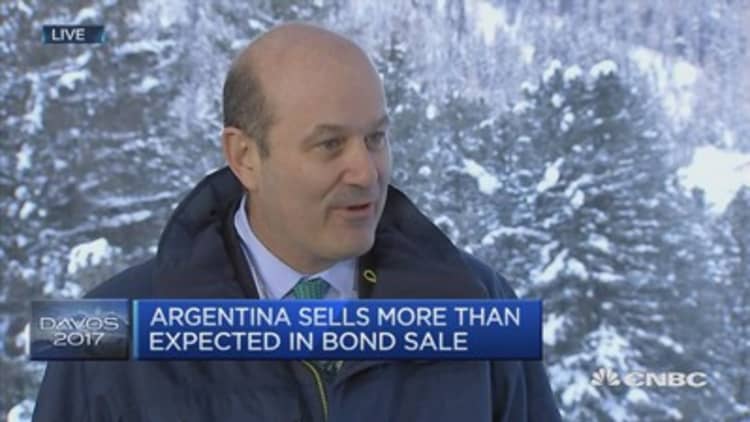"I'll tell him about North Korea, and he'll tell me about lemons," quipped U.S. President Donald Trump as he spoke to reporters alongside his Argentine counterpart Mauricio Macri in the Oval Office last Thursday.
Comedic contrasts aside, Trump's remark encapsulates some of the concerns Macri must straddle as he attempts to further coax Argentina's economic turnaround ahead of midterm elections in October.
Under Macri's leadership, Argentina has gradually angled itself towards greater prominence on the world's stage. It will host the World Trade Organization ministerial meeting in December of this year as well as a G20 summit in 2018. Both events will be the first of their kind to be held in South America.
But running parallel to these important international commitments remains the dissatisfaction and unrest that is palpable domestically. Reflecting national divisions, April 1 saw massive pro-Macri demonstrations in the capital Buenos Aires, yet just five days later, attempting to travel anywhere in the country was nigh on impossible as a strike protesting incomes and job losses crippled infrastructure.
Roadworks litter the streets of Buenos Aires, explained by locals as politicians' attempt to prove to their electorate that change is coming before they head to the polls later this year.
Political conservative Macri was elected in 2015 and leads the country's Cambiemos (Spanish: Let's change) coalition. One year prior, Argentina had defaulted on its debts to the tune of $1.3 billion, a hangover from its 2001-2002 financial crisis which saw the country surrender to one of the largest sovereign debt defaults in history.
Juan Sartori, founder and executive chairman of conglomerate Union Group and Latin America expert, told CNBC via e-mail that Macri was elected on the hope that he would "restructure" the country's sputtering economy and "allow it to fit back into the world economic order."
"His focus has been on expanding the financial services sector and restoring its international credibility. These are still his objectives," Sartori said.
Green shoots have begun to emerge. The IMF forecasts gross domestic product growth for Argentina in 2017 to be 2.2 percent, an improvement considering that the figure was a negative 2.3 percent in 2016. Unemployment is also projected to fall 1.1 percentage points to 7.4 percent this year. Earlier in March, ratings agency Moody's upgraded its outlook for Argentina from stable to positive.
Argentina's central bank introduced an inflation target range in September 2016, aiming for 5 percent in 2019.
Sergio Berensztein, a Buenos Aires-based political analyst for consultancy firm Berensztein, told CNBC via telephone that Argentine "consumers are afraid of spending."
Any apparent uptick in the economy remains abstract numbers, not yet felt by locals. Those CNBC spoke to expressed resignation about their national politics, brought about by the lack of choice.
Sergio, a waiter in Buenos Aires, described a chronic, troubled cycle, saying of politicians: "They inherit a mess, they inherit debt." "It's not that (Macri is) a bad guy, but what can you do?" he added.
Macri's high interest rate monetary policy has also been controversial. The central bank currently lends at 26.25 percent, with steep rates needed to bring down the inflation that the country has historically struggled with. Foreign investors have flooded into government debt to benefit and pushed up the value of the currency, resulting in an overvalued peso. This harms competitiveness for Argentine firms selling abroad and hurts ordinary citizens by making it expensive for them to borrow.

Sartori explained that, "The issue for Macri is that the economic indicators have been slow to change ... and the longer it takes, the greater the opposition (is) against the changes.
"Economic governance is good and it is what international markets are looking for, but Macri has underestimated the time it will take to get international investors back into the market."
Equally, Macri must be careful about opening Argentina's economy up too much. Berensztein said that the president risks losing private sector jobs, and must respect the country's historically protectionist economic stance. With regards to trade, Argentina remains one of the most closed countries in the world.
Political malcontent extends beyond Macri himself. Peronist former president and first lady Cristina Fernandez de Kirchner is currently undergoing corruption investigations. Mariano, a tour guide from Buenos Aires said of Macri, "I don't like him but it's the best option that we have."

